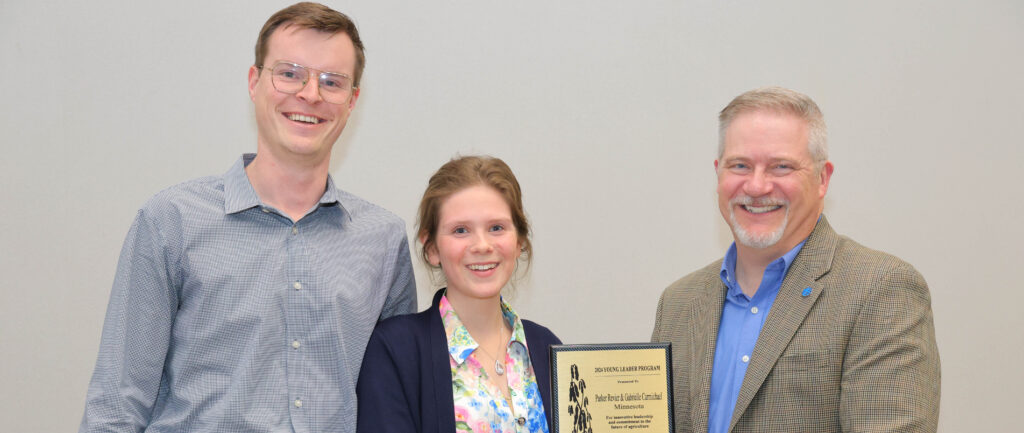This article originally appeared in the 2017 November-December 2017 issue of Soybean Business Click here to read the digital version of the magazine.
Not all dynamic duos need an office.
Sure, Batman and Robin had the Bat Cave, but when your office is the Minnesota Capitol and the nearby Senate Building, it’s better to have a good pair of shoes than a cape.
Cory Bennett and Andrew “A.J.” Duerr are the Minnesota Soybean Growers Association’s (MSGA) equivalent of a dynamic duo. Both took different routes to the Capitol, but now work side-by-side as the official lobbyists for Minnesota soybean farmers.
“I got to the Capitol by pure accident,” says Bennett, who leads MSGA’s lobbying efforts. “I don’t have a political science background. I’m not a lawyer. It just so happened that I got a job at the Capitol. It was my first job right out of college.”
Bennett graduated from Concordia College in Moorhead, Minn., with a biology degree, but grew up near the Capitol’s Sergeant at Arms.
“To make a long story short, he asked me to come down for the session,” Bennett says. “I stayed there for four years, working as Assistant Sergeant at Arms.”
Bennett then transitioned into the role of committee administrator under Sen. Dallas Sams, who also grew up near Bennett’s hometown of Clarissa, Minn., but was hesitant not having a background in public policy.
“At the time I told him absolutely, but I don’t know much about running a legislative committee,” Bennett says. “He said, ‘Don’t worry about it, you’ll figure it out. I just want someone from back home.’”
Bennett stayed six years under Sams before he started lobbying. He is currently in his 15th year as a lobbyist in Minnesota.
“Lobbying was nothing I had planned on,” Bennett says. “But I did grow up in a family that valued an opinion. I grew up knowing it was important to keep yourself informed, whether it was on national or state issues, and it was important to have an opinion.”
Duerr, who represents the Minnesota Biodiesel Council and works closely with Bennett on MSGA issues, says his route to the Capitol was a little less accidental.
“I went to the University of Minnesota, Morris with the intention of becoming a lawyer,” says Duerr, who grew up in Mora, Minn. “I was a political science major, but when I finished my undergrad, instead of going right into law school, I decided to take a year to do something else. I knew my local senator really well and took a job at the Capitol.”
One of Duerr’s first Capitol jobs was for the House of Representatives, working on the environment committee with former representative, now Senator Kent Eken (DFL-Twin Valley) and the late Rep. David Dill (DFL-Crane Lake).
Duerr attributes his career move to committee administrator of the agriculture committee to his time working on the farm.
“When the same job Cory had opened up, committee administrator of the ag committee, Al Juhnke was the current chair, and I decided to apply for it,” Duerr says. “I was hesitant whether I should add that I was a farm hand on my resume, but decided to do it. It was the shortest interview I ever had.”
Duerr was selected for the job and from there, got more involved with ag policy. Three years later, Duerr moved into a lobbying role.
A day in the life

When asked about a typical day for a lobbyist at the Capitol, the duo agreed upon one thing – they don’t exist.
“Every day is different,” Bennett says. “There isn’t a day where I can say, ‘I did the same thing yesterday.’ But that’s really what I love about this job. I don’t know exactly how each day is going to go until we are in the middle of it.”
Even though each day can be different, Bennett and Duerr try to maintain a semblance of a routine.
“We get up each morning, just like everyone else, and put on our suit and tie,” Bennett says. “But before that, we are going through our emails, our Twitter feeds and reading the newspaper. We want to know what the picture looks like when we get to the Capitol that morning.”
Duerr agrees.
“It’s very hard to plan out your day because things can change so rapidly,” he says. “The night before, you look at the combined House and Senate committee hearing schedule for the next day, but then check it again in the morning. They can change that fast.”
While it’s difficult to pinpoint a typical day, Bennett and Duerr describe their average day at the Capitol like this:
7 a.m. Arrive at the Capitol
7:30 a.m. Meet for coffee and compare the day’s agenda and game plan
8:15 a.m. Committee hearings begin
Noon. Lunch with other agriculture lobbyists at the Capitol cafeteria or local food trucks
1 p.m. Committee meetings continue
Afternoon. If not in committee meetings, or meeting with legislators or staff members, they can be found in the legislative reference library in the State Office Building or library at the Capitol catching up on emails or writing reports.
5 p.m. Attend nightly legislative receptions, fundraiser events or end-of-day meetings with specific legislator or staff
6 p.m. Head home
7:30 p.m. Write reports, catch up on emails and prep for tomorrow’s day
Getting the job done
Lobbyists are given the task of influencing legislators to act or vote a specific way on proposed legislation, but how they do this varies from legislator to legislator.
“It depends on your relationship with the legislator, where we’re at in the session and on their personalities,” Bennett says. “What I’ve found the most effective is talking with legislators early on in their offices to get that one-on-one time.”
Bennett says this becomes almost impossible once the session gets rolling.
“After you’ve made that initial contact early on, you can then find them in the hallways for short conversations.”
Duerr concurs.
“Many legislators prefer the hallway,” Duerr says. “Their schedules are so chaotic and jam-packed, they just don’t have time for another office visit.”
Bennett says flexibility can be key when dealing with legislators.
“You do have to be sensitive in terms of where we’re at in session and where they’re (legislators) at in the course of their day,” Bennett explains. “You might be wanting to talk to them about an issue, but if they’re dealing with something else at the moment, you may not even be on their radar. You kind of have to work with them, and know when it’s time to talk and when it’s not.”
“It’s a case-by-case basis when it comes to the 201 legislators,” Duerr adds.
Registered lobbyists are not allowed to enter the House and Senate floor, but citizens of the state are allowed. Because of this, Duerr and Bennett spend time outside the chambers, watching on television screens and sending in notes.
“We’ll send in hundreds of notes each year asking to talk to legislators outside the chambers,” Duerr says. “We’re also allowed to text them. More often than not, they’ll stop and talk to you.”
Even though it’s critical to get in front of the legislators, staff members play an intricate role when it comes to decision making and influence.
“It’s important to make contact with the legislators because they’re making the decisions, but it’s just as important, if not more, to have a relationship with the staff members,” Bennett says. “We have to build that relationship. Staff has quite a bit of influence, plus they’re more available. It’s an extremely important relationship to have.”
Being visible and available for both the legislators and staff has also been a key component to MSGA’s success at the Capitol.
“You have to keep a high enough profile,” Duerr says. “You don’t want an issue to come about and someone to ask, ‘So who is it that works with the Minnesota Soybean Growers Association?’ You also have to have a good reputation where they want to call you.”
A tight-knit community
When it comes to Minnesota agriculture lobbyists, Duerr and Bennett describe their group as a small, tight-knit community.
“We, along with Thom Petersen (Government Relations Director for Minnesota Farmers Union), have a text message group where we average almost 30 texts daily,” Duerr says. “Just informing each other of what’s going on.”
Because of the small number of agriculture lobbyists, Bennett says they collaborate when they can, but MSGA is willing to pave its own path.
“Agriculture groups align on nearly 98 percent of the issues,” he says, “but if we don’t agree, MSGA is not afraid to go out by ourselves. We have and will continue to do so.”
However, the community of lobbyists does not stop at only agriculture groups, as Bennett and Duerr work with non-ag lobbyists as well.
“I like to frame it as going to a small high school,” Bennett says. “We all know each other. We all know who they represent. You may not always agree with them on an issue, but you do have the opportunity to speak with them and understand where they are coming from.”
Duerr says they’ve made it a point to connect with lobbyists on the opposite side of the fence and create an open dialogue.
“There will be times when the other side won’t want you to know what they’re doing, so you have to anticipate what’s to come,” Duerr says. “One thing we always ask ourselves when working on controversial issues is, ‘What would we do if we were on the other side?’ You have to be ready to anticipate their next move.”
From the local level to St. Paul
MSGA, comprised of a board of soybean farmer-leaders, is a membership-based, grassroots organization that ensures Minnesota soybean farmers have a voice in St. Paul and Washington D.C. Farmer leaders call the shots.
“In this process, our directive comes directly from the board,” Bennett says. “We are given our direction and ultimately, everything is the board’s decision. As lobbyists, we aren’t meeting with legislators or staff on behalf of ourselves, but on behalf of MSGA. We are the mouth piece.”
Duerr, as MBC’s voice on biodiesel, says lobbying is all business.
“Whatever the board decides, we lobby for or against with our full ability,” Duerr adds. “There’s no personal opinion involved.”
Besides using its lobbyists in St. Paul, MSGA has also invested into a new tool, Phone2Action, which allows smartphone users to send a letter to their local legislators on pertinent issues within only a couple minutes.
“More and more legislators want to hear from their constituents,” Bennett says. “They want to know how direct legislation will affect them. Lobbyists are important. They’re the eyes and ears of the Capitol. They can navigate you through a complicated process and open doors that probably weren’t open before. But nothing compares to the relationship between constituents and their legislators.”
Then to now
Throughout the duos’ seasoned years of lobbying at the Capitol, they have seen their fair share of changes when it comes to the current legislature and way of lobbying.
“The legislature has changed dramatically,” Bennett says. “The urban-rural divide has gotten worse. The partisan lines have gotten a lot deeper. Some of the issues dividing us right now are substantial. We used to overcome those. The legislature would come together in the end, but we’re definitely seeing a lot more special sessions. This is something we need to figure out how to overcome. These differences aren’t going to go away.”
But according to Duerr, often times lobbyists can help bridge that gap. They’re party blind.
“I would never call myself a Democratic lobbyist or Republican lobbyist,” Duerr says. “I lobby all 201 legislators effectively, and so does Cory. When a controversial issue comes up, lobbyists are the ones talking to both sides. Even if they aren’t talking to each other, they sort of are through us.”
Bennett says the social aspect between legislators has also changed.
“There was a time when legislators would get together over a beer or glass of wine and be able to relate to each other on a personal level,” he says. “I think those interactions are limited, especially when it comes to partisan lines.”
Duerr says along with the changes in the legislature, lobbying has also experienced welcomed progressions.
“The old school lobbying was to hire yourself a good lobbyist and say, ‘Here’s our list of priorities. Head to St. Paul and we’ll see you in five months.’ This is not how things are done anymore. Clients are much more involved, and that’s great to see.”
Duerr says his role as a lobbyist has changed to more of a carrier of messages, the day-to-day guy at the Capitol who provides MSGA access to sharing their own message and stories.
“When it comes to a dues-paying organizations like MSGA, the members want to be a part of the process and want to be informed of what’s going on throughout the session,” Duerr says. “Communication is much more important between the local level and what’s happening in St. Paul. MSGA is a perfect example of an organization that has become much more politically active. They want to be a part of it.”
Duerr says another big change is lobbying the regulatory agencies more and more every year.
“I find myself at the Minnesota Department of Agriculture almost once a week, if not more, during session,” Duerr adds.
A human approach
It is no surprise lobbying can be an emotionally draining job with long hours, especially during the frenetic final weeks of session. Duerr says it’s important to not take things personal and let the job consume you.
“If you take everything personal, this job will really break you,” Duerr says. “As frustrating as it may be, it’s a really cool job. We don’t know what our day is going to be like, but I’ve learned you got to have a sense of humor when working at the Capitol. Through all this craziness and chaos, you have to find humor in it.”
“It can’t be your entire life,” Bennett adds. “It can be 98 percent of your life while in session, but you can’t get so wrapped up in it. A block from here, no one knows what we’re even doing. It’s important to keep it in perspective. We’re just a couple farm kids in the big city. It keeps you grounded.”
MSGA Lobbyists Fun Facts
- Bennett enjoys fishing, hunting and cooking
- Bennett has two daughters, one who just celebrated a Sweet 16
- Bennett has one German Shepherd
- Duerr grew up milking cows in Kanabec County
- Duerr is a member of the St. Paul Curling Club
- Duerr’s wife is also a lobbyist.





